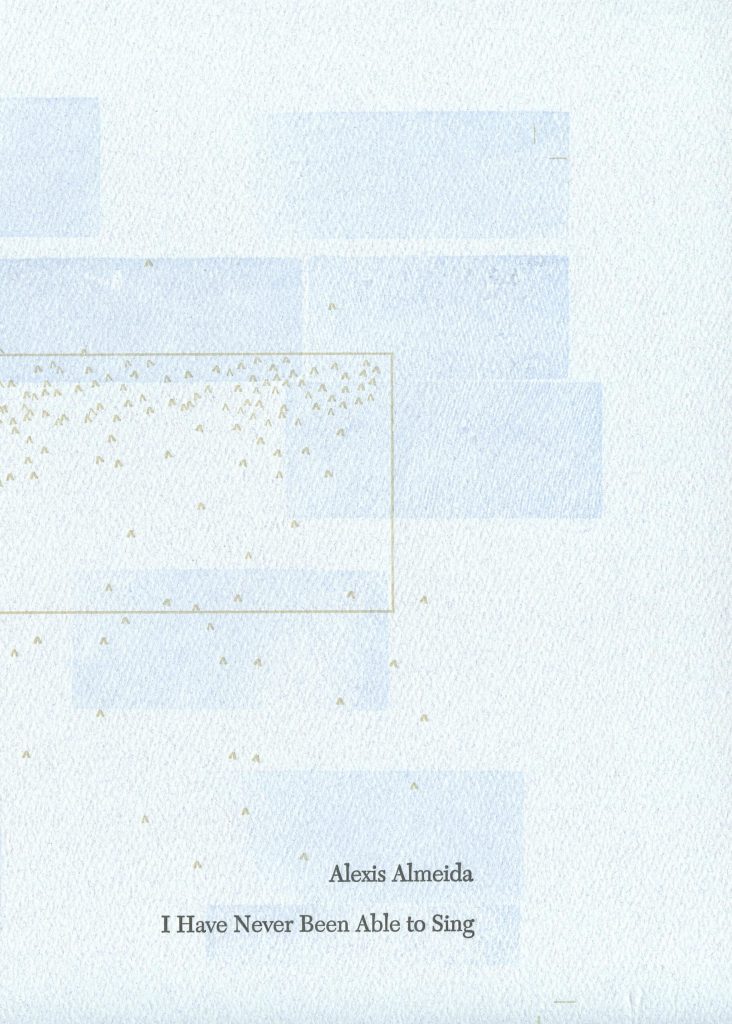
I Have Never Been Able to Sing
Alexis Almeida
October 2018
I have never won the lottery. I have never flown to Lapland. I have never ice-fished, though I would like to. When I read a poem, I wonder if it is doing anything. I don’t hold on to promises. I am not making overtures. I can’t walk in and out of language. I am not coming down from an episode. I assume the weight of objects. I often close my eyes when I’m rushed.
I continue to believe in the magnificent modesty of the cycle.
John Godfrey
An experiment in creating an autobiography’s negative, I Have Never Been Able to Sing draws inspiration from the discursive, non-linear sentences of Rosmarie Waldrop’s The Reproduction of Profiles and Édouard Levé’s Autoportrait, as well as from the intricate curvature of Leon Ferrari’s heliographic drawings and Leslie Hewitt’s multi-layered photographs. Unfolding through a series of discrete moments and overlapping fragments, the poem explores the unstable ground of dichotomy, the constant slippage between past and present, real and imagined selves.
About the Author
Alexis Almeida is the author of I Have Never Been Able to Sing (Ugly Duckling Presse) and most recently the translator of Dalia Rosetti’s Dreams and Nightmares (Les Figues) and co-translator of Carlos Soto Román’s 11 (Ugly Duckling Presse, 2023). Her poems, prose, translations, and interviews have recently appeared in FENCE, Oversound, BOMB, the Poetry Project Newsletter, and elsewhere. She teaches at the Bard Microcollege at the Brooklyn Public Library and edits 18 Owls Press.
Praise
I Have Never Been Able To Sing – maybe Alexis Almeida says so, but the so-named collection of prose paragraphs belies that. All the statements, set in a context of candor and revelation, are direct and equivalent in length. They all act as would a bar of music. Each statement tells of modest insights into her own self. All are within one standard deviation from a middle – “I move toward and away from the middle.” – and anguish, earnest sincerity, scandalous extremes and guilt play no part. The close range of sentiments allows for microtones and each paragraph establishes its unique subtle harmony. There is no rules-based reason for this, but essential is how the statements are weighted toward “I have never..”, as in the title. The impeccable sequencing of “never” statements and affirmative statements, together with the musical brevity of each one, makes a musical composition. The never/affirmative motif changes from poem to poem and no poem is exclusively one or the other. Maybe what has never been is more real than what has been. For me there is less innocence here than there is unforcedness. After more than several readings I continue to believe in the magnificent modesty of the cycle, as when I listen to a Cage composition for keyboards from the 1940s.
Jon Godfrey
In Alexis Almeida’s I Have Never Been Able to Sing, where the having never of the speaker's "I have never" toys with becoming a verb, a "nevering," the something of a negation that pushes the speaker and poem into what is, we see possibilities and paths unfold—the intimacies of "preference," "love," "trust": "I have never held a gun…I do not scare easily. I have never trusted the idea of unconditional love, though I have often wanted to be loved unconditionally. I prefer silence to small talk.” Part confession and incantation ("When I fall in love, I can feel myself emptying."), part Myers-Briggs answer sheet and language of first intimacy ("I have never divorced, eloped, or ghosted."), Almeida's rich and compelling sequence of negations and assertions plays on the senses and the mind like dexterous fingers weaving fine, strong threads.
Robert Fernandez
In Alexis Almeida’s I Have Never Been Able to Sing, I feel the bend, the contraction, the shudder in the crossing between what one has never done and what one is. Something soft opens in the interstice, something funny, something like awe, which I begin to understand as the sheer coming-into-being of the utterance looking at itself.
Renee Gladman
In this haunting incantatory poem, Alexis Almeida finds a form in the negative space of knowing. Equal parts erasure and accumulation, it defines a self in an anaphoric, high-stakes slumber party game that whispers through the night.
Kate Colby
In the News
Links
Other UDP publications Alexis Almeida has contributed to here
Alexis Almeida’s essay on translating Roberta Iannamico featured on Harriet blog
Poems by Alexis Almeida on Folder Magazine
Alexis Almeida’s translation of a Martín Gambarotta poem on BOMB Magazine
Alexis Almeida reads from Roberta Iannamico’s Spate
Alexis Almeida’s It’s Growing Stronger featured on Tarpaulin Sky by Julia Cohen
Publication Details
Chapbook
Hand-bound. 24 pp, 4.5 x 7 in
Publication Date: October 01 2018
Distribution: Direct Only